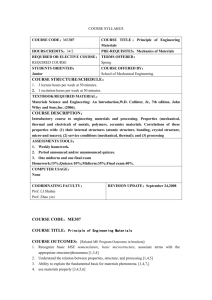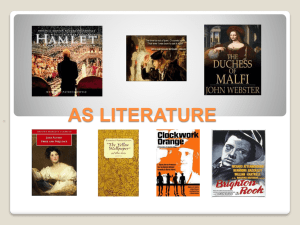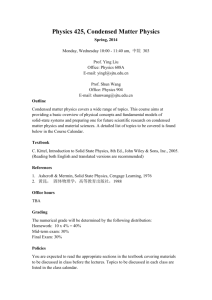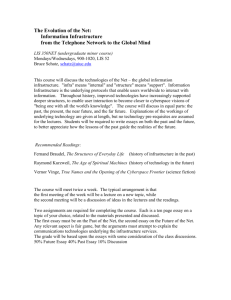Gender, Power, and Politics on the Early Modern Stage Professor
advertisement
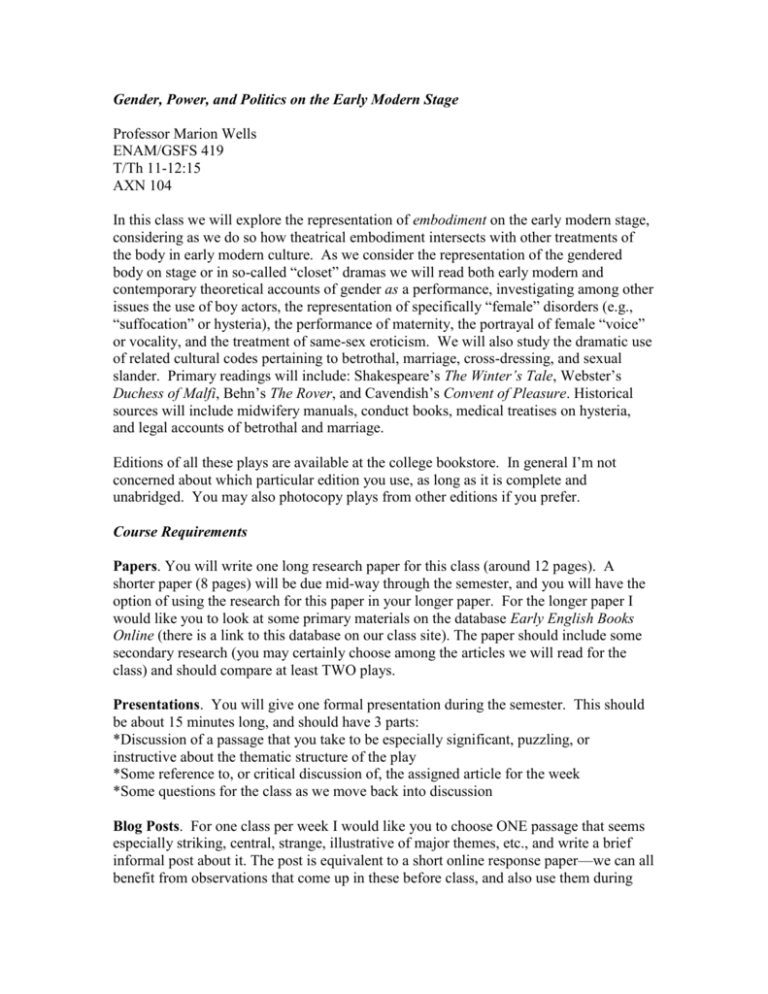
Gender, Power, and Politics on the Early Modern Stage Professor Marion Wells ENAM/GSFS 419 T/Th 11-12:15 AXN 104 In this class we will explore the representation of embodiment on the early modern stage, considering as we do so how theatrical embodiment intersects with other treatments of the body in early modern culture. As we consider the representation of the gendered body on stage or in so-called “closet” dramas we will read both early modern and contemporary theoretical accounts of gender as a performance, investigating among other issues the use of boy actors, the representation of specifically “female” disorders (e.g., “suffocation” or hysteria), the performance of maternity, the portrayal of female “voice” or vocality, and the treatment of same-sex eroticism. We will also study the dramatic use of related cultural codes pertaining to betrothal, marriage, cross-dressing, and sexual slander. Primary readings will include: Shakespeare’s The Winter’s Tale, Webster’s Duchess of Malfi, Behn’s The Rover, and Cavendish’s Convent of Pleasure. Historical sources will include midwifery manuals, conduct books, medical treatises on hysteria, and legal accounts of betrothal and marriage. Editions of all these plays are available at the college bookstore. In general I’m not concerned about which particular edition you use, as long as it is complete and unabridged. You may also photocopy plays from other editions if you prefer. Course Requirements Papers. You will write one long research paper for this class (around 12 pages). A shorter paper (8 pages) will be due mid-way through the semester, and you will have the option of using the research for this paper in your longer paper. For the longer paper I would like you to look at some primary materials on the database Early English Books Online (there is a link to this database on our class site). The paper should include some secondary research (you may certainly choose among the articles we will read for the class) and should compare at least TWO plays. Presentations. You will give one formal presentation during the semester. This should be about 15 minutes long, and should have 3 parts: *Discussion of a passage that you take to be especially significant, puzzling, or instructive about the thematic structure of the play *Some reference to, or critical discussion of, the assigned article for the week *Some questions for the class as we move back into discussion Blog Posts. For one class per week I would like you to choose ONE passage that seems especially striking, central, strange, illustrative of major themes, etc., and write a brief informal post about it. The post is equivalent to a short online response paper—we can all benefit from observations that come up in these before class, and also use them during class discussion. It is also my hope that you will develop a portfolio of blog responses that may come in useful for your papers. Come to class ready to talk about your post and exchange ideas with other students. Grade breakdown: First paper: 25 % Class participation (including presentation): 20% Final Paper: 40% Blog: 15% February 11: Introduction The Woman’s Tongue: Bridling, Scolding, Taming February 13: Shakespeare, The Taming of the Shrew Butler, “Performative Acts and Gender Constitution” February 18: Shakespeare, The Taming of the Shrew Boose, “Bridling Scolds” (pdf) February 20: Shakespeare, The Taming of the Shrew Joannes Bramis, “A Merry jest of a shrewde and curste wife, lapped in morrelles skin” (pdf) February 25: Fletcher, Tamer Tamed Robert Cleaver, extracts from Godly Form of Household Government (pdf in class) Laqueur, from “Making Sex” February 27: Fletcher, Tamer Tamed Mar 4: Jonson, Epicoene Orgel, from Impersonations Mar 6: Jonson, Epicoene Mothers and Others: Maternal Performativity Mar 11: Shakespeare, The Winter’s Tale Stallybrass, “The Body Enclosed” Mar 13: Shakespeare, The Winter’s Tale Introduction to Performing Maternity in Early Modern England (Moncrief and McPherson) Mar 18: Shakespeare, The Winter’s Tale Sedgwick, from Between Men Mar 20: Webster, The Duchess of Malfi An Homily of the State of Matrimony (Renaissance Electronic Texts 1.2) The infortunate mariage of a Gentleman, called Antonio Bologna wyth the Duchesse of Malfi, and the pitifull death of them both, from Painter, The Second Tome of the Palace of Pleasure (pdf) Mar 21 PAPER ONE DUE RECESS Apr 1: Webster, The Duchess of Malfi Jankowksi, “Defining/Confining the Duchess” Apr 3: Webster, The Duchess of Malfi Witches and other “Monsters” in Nature Apr 8: Dekker, et al., The Witch of Edmonton Deborah Willis, from Malevolent Nurture (pdf) Apr 10: Dekker, et al, The Witch of Edmonton *from King James I, Demonology, In Form of a Dialogue *An Act against Conjuration, Witchcraft, and Dealing with Evil and Wicked Spirits Apr 15: Middleton, The Roaring Girl Jean Howard, “Sex and Social Conflict” Apr 17: Middleton, The Roaring Girl From The Life and Death of Mrs. Mary Frith (pdf) Out of the Closet: Women Onstage and Behind the Scenes Apr 22: Behn, The Rover Pacheco, “Rape and the Female Subject” Apr 24: Behn, The Rover Apr 29: Behn, The Rover May 1: Cavendish, Convent of Pleasure Katherine Kellett, “Performance, Performativity, and Identity in Margaret Cavendish’s Convent of Pleasure”(pdf) May 6: Cavendish, Convent of Pleasure May 8: Final class discussion May 9: FINAL PAPER DUE Selection of Relevant Texts on EEBO: Robert Cleaver: A Godly Form of Household Government (1603) Helkiah Crooke: Mikrokosmographia: A Description of the Body of Man (1615) William Gouge: Of Domestical Duties: Eight Treatises (1622) James Guillemeau: Childbirth, Or the Happy Deliverie of Women (1635) Edward Jorden: A Brief Discourse of the Disease called the Suffocation of the Mother (1603) William Perkins: A Discourse of the Damned Art of Witchcraft (1631) Reginald Scot: The Discovery of Witchcraft (1584) Jane Sharp: The Midwives Book (1671) Philip Stubbes: Anatomy of Abuses (1583) Henry Swinburne, Treatise of Spousals (1591) Juan Vives, The Education of a Christian Woman (1523) William Whately: A Bride-Bush, or A Wedding Sermon (1617)

